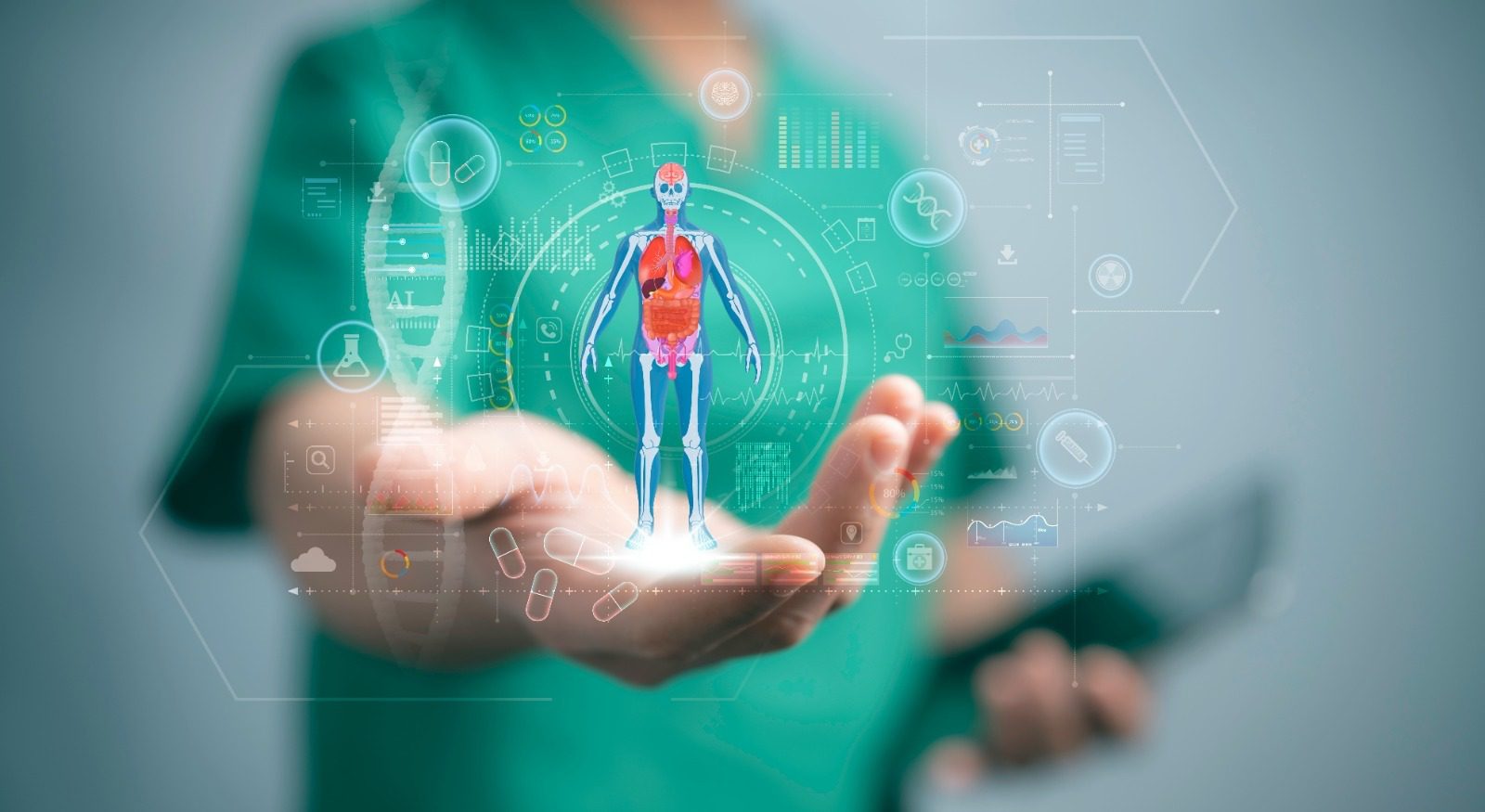

The Power of AI in Diagnostics
One of AI’s most exciting and tangible applications in healthcare is diagnostics. For instance, AI-powered algorithms have been used to analyze vast amounts of medical data, including patient records, lab results, and imaging scans, to assist healthcare providers in making accurate and timely diagnoses. These algorithms often spot patterns and anomalies that may be missed by human clinicians, leading to earlier detection of diseases and the development of more personalized treatment plans, significantly improving patient outcomes. A notable example is the use of AI in diagnosing skin cancer, where AI algorithms have shown to be as accurate as dermatologists in identifying melanoma.
For example, AI-powered imaging systems can analyze medical images such as X-rays, MRIs, and CT scans to detect abnormalities and assist radiologists in diagnosing conditions such as cancer, fractures, and cardiovascular disease. These AI-driven tools improve diagnostic accuracy and help reduce the time and cost associated with manually interpreting medical images.
Enhancing Treatment Planning and Personalization
Healthcare professionals are not just bystanders but active participants in the AI revolution in treatment planning and personalized medicine. By leveraging patient data, genetic information, and clinical guidelines, AI algorithms can assist healthcare providers in developing tailored treatment plans that optimize outcomes and minimize side effects. This collaborative approach, where AI is a tool in the hands of healthcare professionals, is not just key but essential to the success of AI in healthcare.
For example, AI-driven predictive analytics can analyze patient data to identify individuals at risk of developing certain conditions or experiencing adverse events. This proactive approach allows healthcare providers to intervene early, potentially preventing disease progression and improving patient outcomes.
AI is also crucial in drug discovery and development. By simulating molecular interactions and predicting the efficacy and safety of potential drug candidates, AI-powered algorithms can accelerate drug discovery and bring new treatments to market more quickly.
Streamlining Administrative Tasks and Improving Efficiency
Beyond clinical applications, AI is simplifying administrative tasks and improving the efficiency of healthcare delivery. AI-powered chatbots and virtual assistants can handle routine inquiries, schedule appointments, and provide patients with personalized health information, freeing healthcare providers to focus on more complex tasks.
AI-driven predictive analytics can also help healthcare organizations optimize resource allocation and staffing levels, ensuring that resources are allocated efficiently and patients receive timely care. By analyzing historical data and predicting future demand, AI algorithms can help healthcare providers anticipate patient needs and allocate resources accordingly.

Challenges and Considerations
While the potential of AI in healthcare is vast, it also presents significant challenges that must be acknowledged. Privacy concerns, data security, and algorithm bias are just a few of the complex issues that must be addressed. By recognizing these challenges, we can work towards a future where AI in healthcare is safe, effective, and aligned with patient needs. This responsibility falls on all of us, healthcare professionals and researchers, to ensure the ethical deployment of AI in healthcare, making each of us feel committed and responsible.
Moreover, the successful integration of AI into clinical practice is a testament to healthcare’s collaborative and interdisciplinary nature. It requires the collective efforts of healthcare providers, data scientists, engineers, and policymakers, each bringing unique expertise. This collaborative approach is not just key but essential to the success of AI in healthcare, leading to innovative solutions that improve patient care and making each stakeholder feel valued and integral to the AI revolution.
Looking Ahead
As AI advances, its impact on healthcare is only expected to grow. By harnessing the power of AI to improve diagnostics, treatment planning, and administrative efficiency, healthcare providers can deliver more personalized, efficient, and effective care to patients worldwide. However, AI must be deployed responsibly and ethically, focusing on enhancing patient outcomes and improving the overall quality of care.
Certainly! Let’s delve deeper into artificial intelligence’s (AI) transformative potential in healthcare and explore specific examples of AI applications in various patient care areas.

Advanced Diagnostics
AI is revolutionizing diagnostic processes by harnessing the power of machine learning algorithms to analyze complex medical data. For instance, AI-enabled radiology systems can assist radiologists in interpreting medical images with greater accuracy and efficiency. These systems can detect subtle abnormalities in X-rays, MRIs, and CT scans, leading to earlier detection of diseases such as cancer, fractures, and neurological conditions.
Moreover, AI algorithms can analyze genetic data to identify genetic markers associated with specific diseases or treatment responses. By integrating genetic information with clinical data, AI can facilitate more precise diagnosis and treatment planning, particularly in personalized medicine.
Treatment Planning and Precision Medicine
AI is also driving advancements in treatment planning and precision medicine. By analyzing large datasets of patient outcomes and treatment responses, AI algorithms can identify optimal treatment regimens tailored to individual patient characteristics. For example, AI-powered predictive analytics can help oncologists determine the most effective cancer therapies based on a patient’s genetic profile, tumor characteristics, and medical history.
Furthermore, AI-driven decision support systems can assist healthcare providers in selecting the most appropriate medications and dosages for patients, minimizing the risk of adverse reactions and maximizing therapeutic efficacy. These systems analyze patient data, clinical guidelines, and real-time medical literature to generate personalized treatment recommendations aligned with evidence-based practices.
Administrative Efficiency and Healthcare Delivery
Challenges and Ethical Considerations
While AI’s potential benefits in healthcare are immense, its widespread adoption presents significant challenges and ethical considerations. Privacy concerns, data security, and algorithm bias are critical issues that must be addressed to ensure AI’s responsible and ethical use in healthcare.
Moreover, integrating AI into clinical practice requires careful validation and ongoing monitoring to ensure AI-driven solutions’ accuracy, safety, and effectiveness. Healthcare providers, data scientists, engineers, and policymakers must collaborate to develop robust regulatory frameworks and guidelines for the responsible deployment of AI in healthcare.

In conclusion, artificial intelligence transforms patient care by revolutionizing healthcare diagnostics, treatment planning, and administrative efficiency. By harnessing the power of AI algorithms to analyze medical data, personalize treatment regimens, and optimize healthcare delivery, providers can deliver more precise, efficient, and effective care to patients worldwide. However, addressing privacy, security, and algorithm bias challenges is essential to ensure that AI is deployed responsibly and ethically, focusing on enhancing patient outcomes and improving the overall quality of care.

The Complexities of Tipping in the U.S.: A System in Need of Change
Tipping in the United States is so deeply ingrained in our culture that it feels almost automatic.

Exploring the Rich History and Origin of Turkish Coffee
Coffee is special in cultures worldwide, with unique rituals and traditions.

The Timeless Elegance of Friendship:Why Every Woman Needs a BFF.
In the grand tapestry of life, there exists a delicate and precious thread that weaves joy into the mundane and transforms ordinary moments into extraordinary memories.
instagram:
Error: No feed found.
Please go to the Instagram Feed settings page to create a feed.


